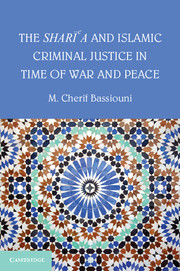Book contents
- Frontmatter
- Contents
- Glossary of Terms
- Table of Abbreviations
- Introduction
- 1 The Sharīca, Islamic Law (Fiqh), and Legal Methods (cIlm Uṣūl al-Fiqh)
- 2 The Postulates of Human Rights and the Place of Justice in Islam
- 3 The Islamic Criminal Justice System
- 4 Islamic International Law and International Humanitarian Law
- 5 The Sharīca, Islamic Law, and Contemporary Post-Conflict and Transitional Justice
- Appendix A Chronology of Significant Dates in the History of Islam
- Appendix B Armed Conflicts Involving Muslim States
- Appendix C Statute of the International Islamic Court of Justice
- Appendix D The Cairo Declaration on Human Rights in Islam
- Appendix E Convention of the Organization of the Islamic Conference on Combating International Terrorism
- Bibliography
- Index
- References
3 - The Islamic Criminal Justice System
Published online by Cambridge University Press: 05 June 2014
- Frontmatter
- Contents
- Glossary of Terms
- Table of Abbreviations
- Introduction
- 1 The Sharīca, Islamic Law (Fiqh), and Legal Methods (cIlm Uṣūl al-Fiqh)
- 2 The Postulates of Human Rights and the Place of Justice in Islam
- 3 The Islamic Criminal Justice System
- 4 Islamic International Law and International Humanitarian Law
- 5 The Sharīca, Islamic Law, and Contemporary Post-Conflict and Transitional Justice
- Appendix A Chronology of Significant Dates in the History of Islam
- Appendix B Armed Conflicts Involving Muslim States
- Appendix C Statute of the International Islamic Court of Justice
- Appendix D The Cairo Declaration on Human Rights in Islam
- Appendix E Convention of the Organization of the Islamic Conference on Combating International Terrorism
- Bibliography
- Index
- References
Summary
Introduction
Throughout history, human societies have used coercive measures against those who have transgressed protected societal interests. These interests have at times reflected certain social values, whereas, at other times, they merely reinforced the interests of elites. Even though criminal justice systems across the world have varied, over time they have come to share common characteristics that made it possible to broadly classify them into families based on similarities between processes and norms. Eventually the contemporary families of legal systems emerged, some based on a customary approach, others on a codified approach, and yet others on religious norms. Notwithstanding the differences between the various criminal justice systems throughout history, they have all shared the same components, namely, normative provisions, procedural rules, evidentiary requirements, and applicable sanctions. The Islamic criminal justice system is no different, as it contains all four of these components and shares a number of similarities with other systems. Notwithstanding these similarities, the Islamic criminal justice system has its peculiarities and unique complexities that are derived, in large part, from its sources in the Qur’ān and the sunna, as well as the fiqh that derives from these sources. These peculiarities and complexities are also derived from its relationship to concepts of human social justice. But, it is not a comprehensive system as is the case of the Romanist-Civilist family of legal systems. Instead, it more closely resembles the common law system.
- Type
- Chapter
- Information
- Publisher: Cambridge University PressPrint publication year: 2013
References
- 2
- Cited by



